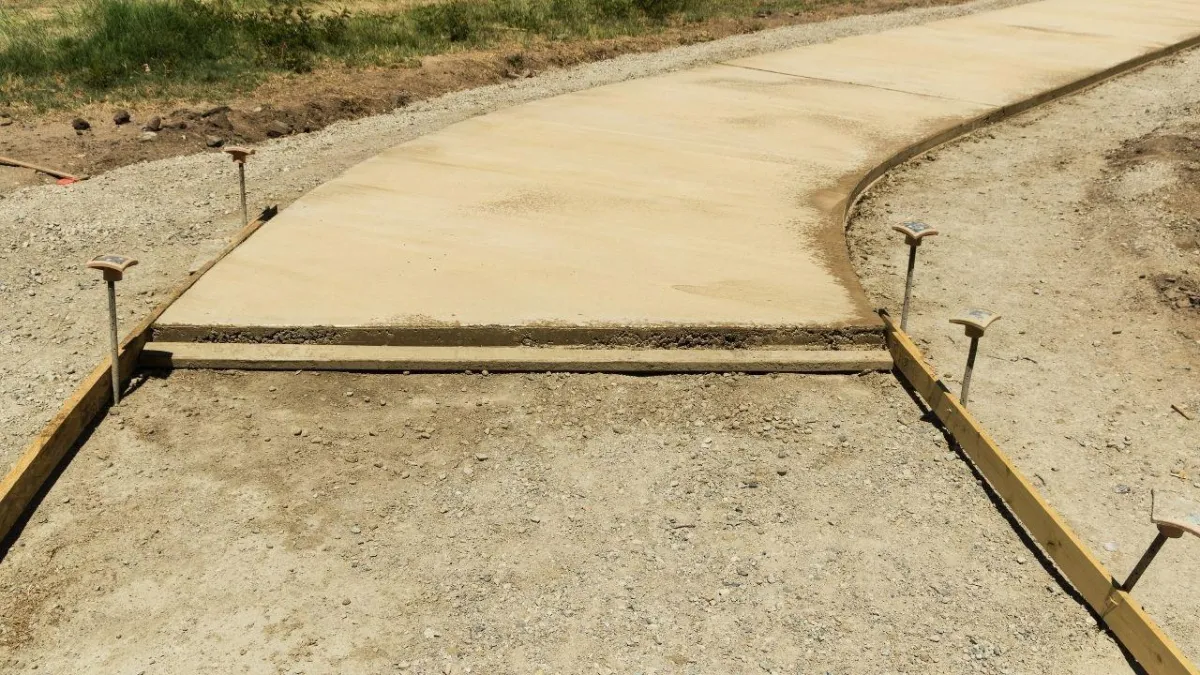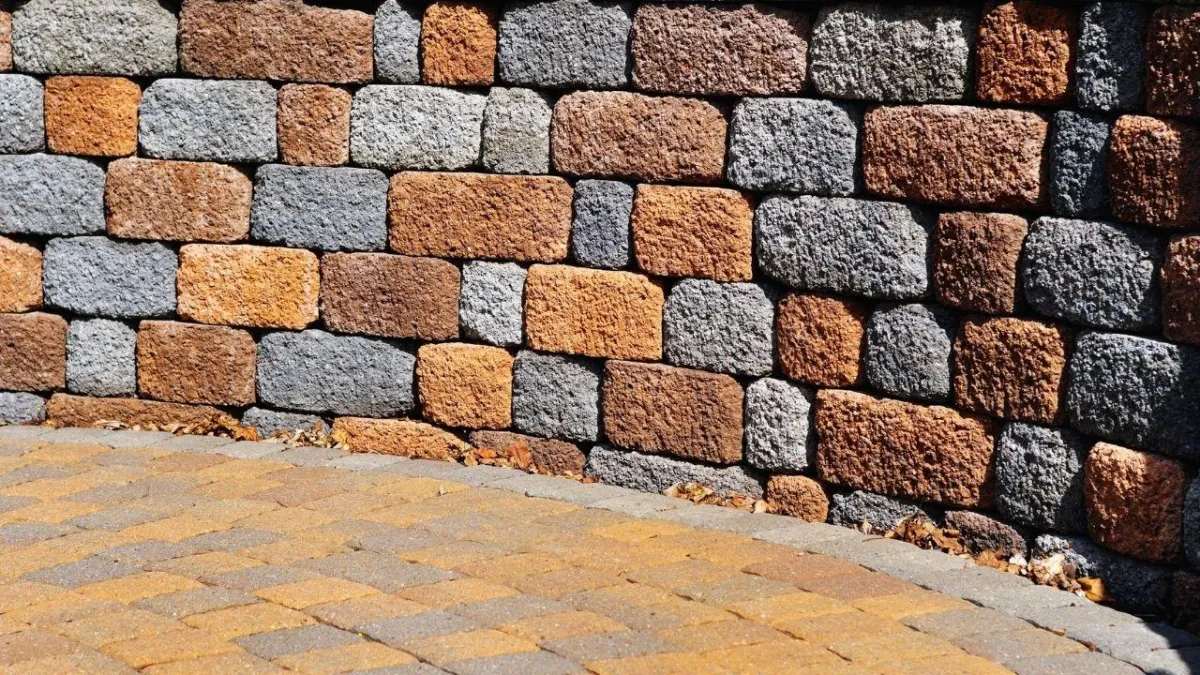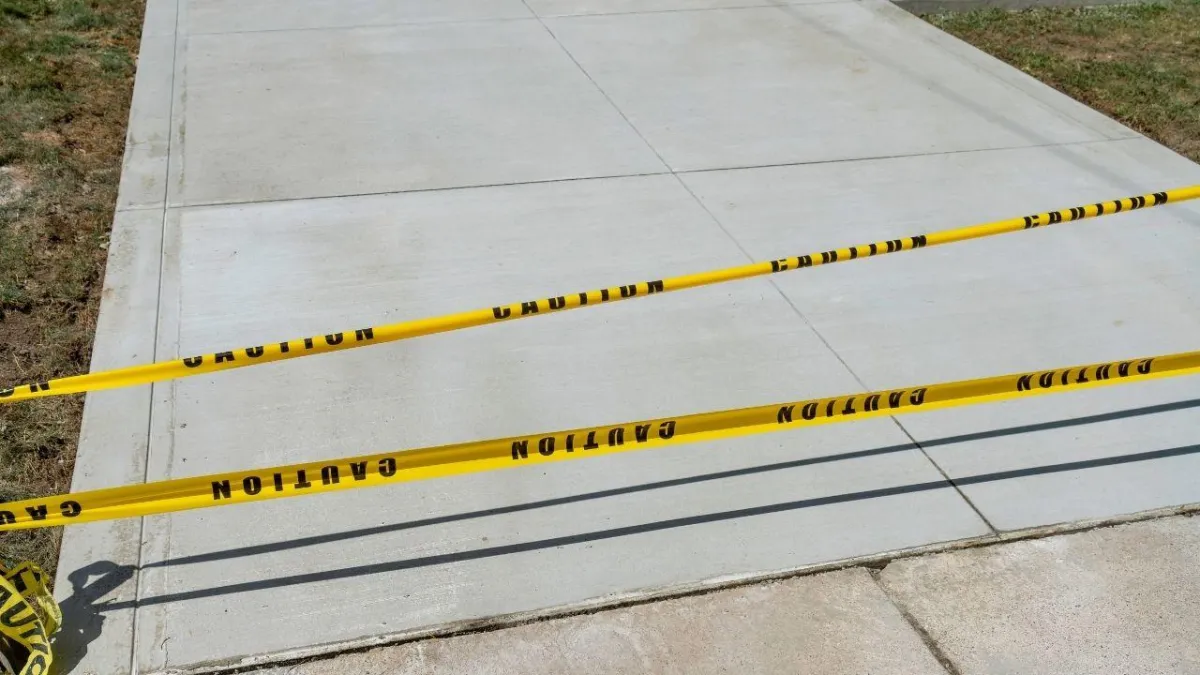Expert Concrete Services in Knoxville, TN
At Knoxville Concrete Co, we specialize in providing high-quality concrete services to residential and commercial properties throughout the Knoxville, TN area. With a focus on durability, aesthetics, and customer satisfaction, our experienced team of concrete contractors in Knoxville, TN delivers superior results for all types of concrete projects. Whether you're looking for a new driveway, need concrete repairs, or want a custom patio, we offer a comprehensive range of services that will meet your unique needs.

Comprehensive Concrete Solutions in Knoxville, TN
Knoxville homeowners and businesses rely on Knoxville Concrete Co for a broad array of concrete services. Our team is skilled in concrete installation, repair, and restoration, and we take pride in offering personalized solutions that suit the needs of each individual property. We handle everything from foundations, patios, and sidewalks to stamped concrete, driveways, and retaining walls. Whatever the scope of the project, you can count on us to provide expert craftsmanship and high-quality materials to ensure long-lasting results.
Common Concrete Issues You Shouldn’t Ignore
Cracks and Settling in Concrete Surfaces
Concrete can crack or settle over time due to various factors such as temperature fluctuations, moisture levels, and soil shifting. In Knoxville, where humidity and rainfall are frequent, cracks often appear in driveways, foundations, or patios. These cracks may seem small at first, but they can worsen quickly if not addressed. As concrete continues to expand and contract, larger fissures and settling can occur, which could eventually affect the structural integrity of the property. It’s important to act fast and contact a qualified concrete contractor in Knoxville, TN to prevent further damage.
Uneven Concrete Slabs and Foundations
Uneven concrete surfaces are another common problem that property owners in Knoxville face, especially considering the area's unique soil conditions and occasional ground shifts. When the soil beneath a concrete slab settles or expands, it can cause the slab to become uneven or sink. This is often seen with driveways, walkways, and even foundations. Not only can uneven surfaces affect the aesthetic appeal of your property, but they can also lead to safety hazards. We specialize in slab leveling and foundation stabilization using effective techniques that restore your concrete to its original condition.
Water Accumulation and Drainage Issues
Water pooling around your concrete surfaces is a significant concern in Knoxville’s climate, as the area experiences frequent rain. Without proper drainage, water can accumulate around driveways, patios, and foundations, causing erosion, cracking, and even water damage inside your home. Excess moisture can also promote the growth of mold and mildew, especially in crawl spaces. Our team provides solutions that redirect water away from your concrete structures, ensuring that your property stays dry and that your concrete surfaces remain in top condition.
See What Our Clients in Knoxville Say About Working With Us
Choosing Knoxville Concrete Co for your concrete project means working with a team of dedicated professionals who understand the unique needs of Knoxville’s properties. We take pride in delivering exceptional results that meet the highest standards of quality and craftsmanship. When you choose us, you’re choosing a reliable partner who will work closely with you to ensure your concrete surfaces are durable, attractive, and long-lasting.

"Knoxville Concrete Co did an amazing job on our new driveway and patio. Their team was professional, on time, and the finished product exceeded our expectations!"

Carmen L.
Knoxville TN Homeowner

I needed a new driveway, and the team at Precision and Decorative Concretes delivered exactly what I was looking for. The quality of their work is top-notch.

Marcy W.
West Hills Resident
Contact Knoxville Concrete Co Today
If you're in need of concrete services in Knoxville, reach out to Knoxville Concrete Co for an inspection or consultation. Our team will evaluate your concrete surfaces, provide expert recommendations, and offer a detailed estimate for your project. We’re here to guide you through every step of the process, from initial consultation to project completion.
Our Knoxville, TN Concrete Repair Process
Thorough Inspection and Assessment
Every successful concrete repair project begins with a thorough inspection. At Knoxville Concrete Co, we start by evaluating the condition of your concrete surfaces, identifying cracks, settling, moisture damage, and drainage problems. We also examine the surrounding soil and environment to ensure that we fully understand the contributing factors. By doing so, we can accurately diagnose issues and provide a detailed repair plan. Our team has an in-depth understanding of Knoxville's unique landscape and soil, which allows us to recommend the most effective and long-lasting solutions.
Tailored Solutions for Knoxville Property Owners
No two concrete projects are the same, which is why we offer personalized repair solutions for every property. Whether your driveway has become uneven, your patio is cracked, or your foundation is settling, we will work with you to find the best solution for your needs. Our team takes into account the specific conditions of your property, including its layout, soil type, and exposure to weather elements, to create a repair plan that delivers the best possible results.
Advanced Repair Techniques and Materials
At Knoxville Concrete Co, we are committed to using only the highest-quality materials and the latest repair techniques to restore your concrete surfaces. From polyurethane foam injections for leveling to concrete resurfacing for cosmetic fixes, we use modern methods that ensure lasting results. Our team is skilled in using state-of-the-art equipment to handle everything from minor crack repairs to major foundation stabilization. When you work with us, you can trust that your concrete will be restored to a condition that will withstand the test of time and Knoxville's climate.
Foundation and Slab Repair for Knoxville Properties
Foundations and slabs are critical to the structural integrity of your property, and in Knoxville, where soil and moisture levels can shift, repairs may be necessary over time. Our concrete contractors in Knoxville, TN specialize in foundation and slab repair techniques, such as piering, shoring, and slab jacking. Whether your foundation is cracking or sinking, we will stabilize it with precision, ensuring that your home or commercial property remains secure. We also offer repairs for crawl spaces, which are often affected by moisture and settling soil.
Concrete Services We Provide to Knoxville Residents
At Knoxville Concrete Co, we offer a wide variety of concrete services tailored to meet the needs of homeowners in the Knoxville area. Whether you're building a new structure, replacing an old driveway, or adding decorative elements to your landscape, we have the experience and expertise to deliver durable, aesthetically pleasing results. Our team works closely with homeowners to design and install concrete features that complement the unique style of their properties while ensuring long-lasting performance.
Concrete Patios
A concrete patio is a perfect addition to your outdoor living space, providing a durable and low-maintenance surface for family gatherings, barbecues, and relaxation. At Knoxville Concrete Co, we specialize in designing and installing custom concrete patios that suit the specific needs and style preferences of our clients. Whether you prefer a smooth, sleek finish or a more textured, stamped design, we can create a patio that enhances your outdoor aesthetic. Given Knoxville’s mild climate, a concrete patio provides a solid foundation for outdoor furniture, grills, and entertaining, allowing you to enjoy your backyard all year round.
Concrete Driveways
Your driveway is one of the first things visitors notice when they approach your home, and it plays an essential role in the overall curb appeal of your property. Knoxville Concrete Co offers professional concrete driveway installation and repair services designed to last. Whether you’re looking for a traditional concrete slab, an upgraded decorative design, or a more durable solution to handle the region's rainy climate, our team can help. We also offer driveway resurfacing for those looking to breathe new life into an old driveway without the cost of a full replacement. We understand the unique needs of Knoxville properties and offer customized solutions that withstand the local weather conditions.
Decorative Concrete
Transform your ordinary concrete surfaces into something extraordinary with Knoxville Concrete Co’s decorative concrete services. From stamped and stained concrete to polished finishes, we offer a range of decorative techniques that can mimic the look of more expensive materials like stone, brick, or wood. Decorative concrete is an ideal choice for patios, walkways, driveways, and even interior spaces like basements and kitchens. With Knoxville’s changing seasons, decorative concrete also offers a durable and low-maintenance option that can handle the weather while enhancing your property’s overall aesthetic.
Concrete Walkways & Landscaping
Concrete walkways are a practical and attractive solution for homeowners looking to enhance their landscaping and provide easy access to different areas of their property. At Knoxville Concrete Co, we specialize in designing and installing custom concrete walkways that complement the natural landscape of your home. Whether you're looking for a simple pathway through your garden or a more intricate design to match the style of your property, we can create walkways that blend seamlessly with your outdoor space. Additionally, we provide concrete landscaping solutions such as decorative borders, retaining walls, and garden features to add functionality and visual appeal to your yard. Our team ensures that each walkway is built with durable materials that withstand Knoxville’s seasonal changes and enhance the overall beauty of your landscape.
Why Choose Knoxville Concrete Co?
Over Two Decades of Expertise Serving Knoxville
With over 20 years of experience in the concrete industry, Knoxville Concrete Co has earned a reputation for delivering high-quality, reliable concrete services. We have extensive knowledge of the local climate and soil conditions, which allows us to provide effective and durable solutions tailored to the needs of Knoxville’s homes and businesses. Our skilled team is dedicated to exceeding expectations and ensuring that every project is completed on time and to the highest standards.
Specialized Knowledge of Knoxville’s Concrete Needs
Knoxville’s climate and terrain present unique challenges when it comes to concrete installation and repair. The city experiences a humid subtropical climate, with hot summers, mild winters, and frequent rainfall. These conditions can cause concrete to expand and contract, leading to cracks and other issues. Our team has in-depth knowledge of these challenges and is experienced in selecting the right materials and techniques to ensure that your concrete surfaces perform well, even under these tough conditions.
Understanding the Knoxville Climate and Its Impact on Concrete
Knoxville’s hot summers and rainy seasons can significantly impact concrete structures. The moisture in the air and the frequent rainfall cause concrete to absorb water, which can lead to cracking, erosion, and weakened surfaces. Additionally, the freeze-thaw cycle in the winter can make concrete expand and contract, further contributing to cracks and damage. By understanding these climate patterns, we can provide concrete solutions that are designed to last, offering a level of expertise that only a local company like Knoxville Concrete Co can provide.
Skilled and Certified Technicians
At Knoxville Concrete Co, we are proud of our team of skilled, certified technicians who are experts in their field. Our team undergoes continuous training to stay updated on the latest techniques, tools, and best practices in the concrete industry. We ensure that every technician is knowledgeable about the latest concrete repair methods, as well as local regulations and environmental concerns. When you hire us, you can rest assured that your project is in the hands of experienced professionals committed to delivering the highest quality results.
Residential Concrete Services in Knoxville, TN
Common Concrete Issues in Knoxville Homes
Residential concrete surfaces, such as driveways, patios, and foundations, are prone to a variety of issues, especially in Knoxville’s climate. Common problems include cracks, settling, uneven surfaces, and moisture damage. These issues can arise from Knoxville's frequent rain, humidity, and fluctuating temperatures, which cause concrete to expand and contract over time. If you notice cracks in your driveway, water pooling around your foundation, or uneven sidewalks, it's important to contact a trusted concrete contractor in Knoxville, TN to assess the situation and recommend a proper repair plan.
Concrete Solutions for New Construction Homes
If you’re building a new home in Knoxville, it's crucial to have a solid concrete foundation that will stand the test of time. Our team provides concrete pouring and installation services for new construction projects, ensuring that your foundation is level, stable, and ready to support your home. We work with home builders and property developers to create strong foundations that meet local building codes and are designed to last for years to come.
Commercial Concrete Services in Knoxville, TN
Concrete Solutions for Commercial Properties
Knoxville Concrete Co also provides specialized concrete services for commercial properties throughout the city. Whether you need concrete for a parking lot, sidewalk, or building foundation, our team is equipped to handle projects of any size. We understand the importance of a durable, safe, and aesthetically pleasing concrete surface in commercial spaces, and we work with business owners to deliver high-quality concrete that meets their needs and exceeds expectations.
Knoxville Concrete Co Frequently Asked Questions
What types of concrete services do Knoxville Concrete Co offer?
Knoxville Concrete Co provides a comprehensive range of concrete services for both residential and commercial properties throughout Knoxville, TN. Our services include driveway installation, patios, walkways, foundations, decorative concrete, retaining walls, and concrete repair. Whether you're upgrading your outdoor living space or need durable surfaces for your business, we have the skills and expertise to deliver quality concrete solutions tailored to your needs.
How do I know if my concrete needs to be repaired?
If your concrete surfaces are showing visible cracks, uneven areas, or signs of water pooling, it may be time for a repair. Knoxville's climate, with its humidity and seasonal temperature changes, can cause concrete to shift or crack over time. Having your concrete inspected by a professional ensures that any issues are identified early and addressed before they worsen, saving you money on future repairs.
How long does a concrete driveway installation take in Knoxville?
The installation time for a concrete driveway in Knoxville typically ranges from 1-3 days, depending on the size and complexity of the project. However, the curing process will take an additional 7-10 days to ensure the driveway is properly set. Due to Knoxville's seasonal weather, we recommend scheduling installations in the spring or fall for the best conditions to ensure a smooth and timely process.
Can I use decorative concrete for my patio in Knoxville?
Yes, decorative concrete is an excellent choice for patios in Knoxville, TN, providing both style and durability. Whether you want a stamped, stained, or polished finish, decorative concrete can transform your patio into an attractive and functional outdoor living space. Given Knoxville's mild climate, decorative concrete can withstand the weather, offering a low-maintenance solution that enhances your home's exterior.
What are the benefits of using stamped concrete for walkways?
Stamped concrete is a highly versatile and cost-effective solution for creating beautiful walkways around your Knoxville property. It can mimic the appearance of expensive materials like stone, brick, or slate, offering a custom look that complements your landscaping. The durability of stamped concrete makes it perfect for Knoxville’s weather conditions, as it’s resistant to wear, cracking, and fading from the sun and rain.
How do you ensure the quality of your concrete installations in Knoxville?
At Knoxville Concrete Co, we ensure the quality of our concrete installations by using high-quality materials and employing skilled technicians familiar with the area's specific soil and weather conditions. Our team follows industry best practices to properly prepare and pour concrete, ensuring it’s set to endure the humid subtropical climate of Knoxville. Each project is carefully managed to meet the highest standards of durability, appearance, and functionality.
Do you provide concrete repair services for commercial properties in Knoxville?
Yes, we offer concrete repair services for commercial properties in Knoxville, TN. Whether you’re dealing with a cracked parking lot, damaged sidewalks, or an uneven foundation, our team can provide effective repair solutions that minimize downtime and disruption to your business. We understand the importance of keeping your commercial property safe and accessible, and we work efficiently to get your concrete surfaces back in top shape.
How can I maintain my concrete surfaces in Knoxville?
Maintaining your concrete surfaces in Knoxville involves regular cleaning, sealing, and addressing any cracks or damage promptly. Due to Knoxville's fluctuating climate, sealing your concrete every few years helps prevent water infiltration and protects against wear from freezing and thawing. Regular sweeping and pressure washing will also keep your concrete looking fresh while extending its lifespan.
What is the cost of concrete installation in Knoxville?
The cost of concrete installation in Knoxville depends on factors such as the project size, type of service (e.g., driveway, patio, decorative features), and customization. On average, basic concrete driveways can cost between $3 to $6 per square foot, while decorative options may be priced higher. For an accurate estimate, it’s best to schedule a consultation with Knoxville Concrete Co so we can assess your project and provide a detailed quote.
Are your concrete services covered by warranty in Knoxville?
Yes, all of our concrete services at Knoxville Concrete Co are backed by a warranty, ensuring your investment is protected. The warranty covers workmanship and material defects, giving you peace of mind knowing your concrete installations will last. For more details regarding specific warranty coverage, our team will be happy to go over the terms with you during your consultation.



